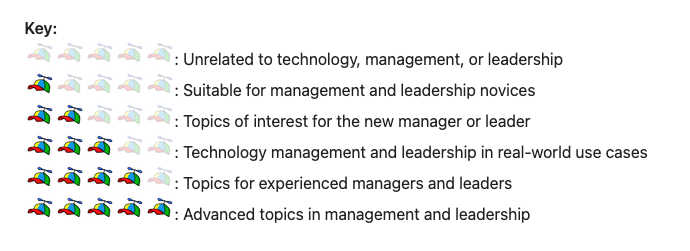QFM003: Engineering Leadership Reading List January 2024
Welcome to the third QFM post for 2024! This post is a link list covering everything I found interesting about engineering leadership during January.
Tags: qfm, engineering, leadership, reading, list, january, 2024
 Source: Photo by Cristina Cerda on Unsplash
Source: Photo by Cristina Cerda on Unsplash
Welcome to the third QFM post for 2024! This post is a link list covering everything I found interesting about Engineering Leadership during January.
Each link has a short summary to give an overview of the post, plus some hashtags for organisation. Both the summary and the hashtags are courtesy of GPT, but the filtering of what made the list is all mine.
I have also provided a handy key using propellor hats, which I hope will further help you determine which articles are worth your time.

Let me know if you like the format or if you can think of any changes that would make the list more useful.
Tech talent market predictions for 2024: Growth, hiring, investors and more:  This article discusses the evolving technology sector, highlighting trends such as stabilisation after a reset, a greater focus on profitability by investors, and the changing role of CTOs in response to these shifts. Key points include the adaptation of tech leaders to emphasise transformation and commerciality and a growing interest among top talent in roles within Private Equity for stability. #TechTrends2024 #InvestorFocus #CTOAdaptation #TechStabilization #PrivateEquityCareers
This article discusses the evolving technology sector, highlighting trends such as stabilisation after a reset, a greater focus on profitability by investors, and the changing role of CTOs in response to these shifts. Key points include the adaptation of tech leaders to emphasise transformation and commerciality and a growing interest among top talent in roles within Private Equity for stability. #TechTrends2024 #InvestorFocus #CTOAdaptation #TechStabilization #PrivateEquityCareers
Highly Profitable Engineering Teams:  This article highlights the importance of aligning engineering team growth with business profitability, focusing on managing complexity, addressing tech debt strategically, and investing in talent development to build highly profitable engineering teams. #EngineeringExcellence #TeamGrowth #TechLeadership #BusinessAlignment #ProfitableTeams
This article highlights the importance of aligning engineering team growth with business profitability, focusing on managing complexity, addressing tech debt strategically, and investing in talent development to build highly profitable engineering teams. #EngineeringExcellence #TeamGrowth #TechLeadership #BusinessAlignment #ProfitableTeams
Making Profitable Software:  This article discusses strategies for making software development profitable, emphasising the importance of careful contract management, avoiding overly customisable features, considering the implications of on-premise deployments, setting realistic limits on data usage and features, and aligning business growth with client success. #SoftwareDevelopment #Profitability #TechBusiness #SaaS #StartupStrategy
This article discusses strategies for making software development profitable, emphasising the importance of careful contract management, avoiding overly customisable features, considering the implications of on-premise deployments, setting realistic limits on data usage and features, and aligning business growth with client success. #SoftwareDevelopment #Profitability #TechBusiness #SaaS #StartupStrategy
Yes, good DevEx increases productivity. Here is the data:  New research backed by GitHub confirms that good Developer Experience (DevEx) significantly enhances productivity and innovation by optimising flow state, reducing cognitive load, and improving feedback loops, emphasising the need for strategic investments in DevEx for better business outcomes. #DevEx #Productivity #Innovation #DeveloperExperience #GitHubResearch
New research backed by GitHub confirms that good Developer Experience (DevEx) significantly enhances productivity and innovation by optimising flow state, reducing cognitive load, and improving feedback loops, emphasising the need for strategic investments in DevEx for better business outcomes. #DevEx #Productivity #Innovation #DeveloperExperience #GitHubResearch
Insight 💡
There is a link between the last two articles in that they both refer to the way that startups often eschew structure and even celebrate their lack of structure as a virtue, as it allows them to operate unconstrained. The discussions reveal some nuances about the role of hierarchy and autonomy in organisational growth.
On the one hand, the HR Antipatterns article highlights the pitfalls of neglecting structured roles like HR in tech startups, leading to systemic issues such as favouritism and a lack of diversity strategies. This lack of structure can result in dysfunctional management and a workplace environment unsupportive of employees. On the other hand, the Questionable Advice article argues for the necessity of hierarchy, particularly in the form of engineering managers in startups. This structure is viewed as essential for adaptability, efficiency, and scalability. Engineering managers play a pivotal role in coordinating teams and focusing on organisational goals, thereby preventing organisational debt and enhancing productivity.
However, there is a middle ground as there is (generally) no one-size-fits-all approach to management and hierarchy in startups. The key is to balance the need for structure with the level of autonomy that a team can handle. This balance depends on the maturity and capability of the team. While too much focus on process can detract from product development, some level of management, whether formal or informal, is necessary to guide teams, especially in areas like HR.
The overarching theme is that while startups may benefit from a certain fluidity and lack of rigid structure, completely eschewing management can lead to significant organisational challenges. Effective leadership involves recognising the need for and appropriately implementing management structures to support the team’s needs and the company’s objectives.
HR Antipatterns at Startups:  This article discusses the prevalent issues in HR practices at tech startups, highlighting systemic problems such as neglecting HR roles, fostering a culture of favouritism, and lacking diversity strategies. These issues often lead to dysfunctional management and workplace environments that do not effectively support employees. #HRInTech #StartupCulture #DiversityInTech #ManagementChallenges #TechWorkplace
This article discusses the prevalent issues in HR practices at tech startups, highlighting systemic problems such as neglecting HR roles, fostering a culture of favouritism, and lacking diversity strategies. These issues often lead to dysfunctional management and workplace environments that do not effectively support employees. #HRInTech #StartupCulture #DiversityInTech #ManagementChallenges #TechWorkplace
Questionable Advice: “My boss says we don’t need any engineering managers. Is he right?”:  This article discusses the necessity of engineering managers in a startup. The writer addresses a VP of Engineering at a startup with about 40 engineers, organised into small teams led by lead engineers primarily focused on coding. The CEO, a former engineer, opposes hiring engineering managers, viewing them as unnecessary overhead. The article argues that hierarchy, often misunderstood and misused, is crucial for the adaptability, efficiency, and scalability of organisations. It also emphasises the distinct roles and benefits of engineering managers in coordinating teams, managing information, and focusing on organisational goals, highlighting that effective management is key to avoiding organisational debt and ensuring productivity. #EngineeringManagement #StartupLeadership #OrganizationalGrowth #TeamDynamics #LeadershipInsights
This article discusses the necessity of engineering managers in a startup. The writer addresses a VP of Engineering at a startup with about 40 engineers, organised into small teams led by lead engineers primarily focused on coding. The CEO, a former engineer, opposes hiring engineering managers, viewing them as unnecessary overhead. The article argues that hierarchy, often misunderstood and misused, is crucial for the adaptability, efficiency, and scalability of organisations. It also emphasises the distinct roles and benefits of engineering managers in coordinating teams, managing information, and focusing on organisational goals, highlighting that effective management is key to avoiding organisational debt and ensuring productivity. #EngineeringManagement #StartupLeadership #OrganizationalGrowth #TeamDynamics #LeadershipInsights
The Mediocrity Limbo:  This article discusses the importance of being proactive and decisive, especially in professional contexts. It emphasises the need to address mediocrity in hiring, ongoing projects, and personal career development. The author advises quick action to correct or eliminate subpar hires, unproductive initiatives, and personal stagnation, stressing that life is too short for mediocrity. #ProfessionalDevelopment #Leadership #DecisionMaking #CareerGrowth #AvoidingMediocrity
This article discusses the importance of being proactive and decisive, especially in professional contexts. It emphasises the need to address mediocrity in hiring, ongoing projects, and personal career development. The author advises quick action to correct or eliminate subpar hires, unproductive initiatives, and personal stagnation, stressing that life is too short for mediocrity. #ProfessionalDevelopment #Leadership #DecisionMaking #CareerGrowth #AvoidingMediocrity
Get your work recognised: write a brag document:  This article emphasises the importance of maintaining a “brag document” to record and showcase one’s accomplishments at work. This practice aids in self-reflection, helps managers and peers recognise your contributions, and is particularly beneficial during performance reviews and manager transitions. #BragDocument #CareerAdvancement #SelfPromotion #PerformanceReview #WorkplaceSuccess
This article emphasises the importance of maintaining a “brag document” to record and showcase one’s accomplishments at work. This practice aids in self-reflection, helps managers and peers recognise your contributions, and is particularly beneficial during performance reviews and manager transitions. #BragDocument #CareerAdvancement #SelfPromotion #PerformanceReview #WorkplaceSuccess
What Makes a Company Great at Producing Leaders?:  This highlights the key attributes of successful talent incubators. These listed companies excel in developing leaders by strategically attracting, retaining, and investing in talent. They provide comprehensive training and development opportunities, foster high-performance cultures, and maintain strong operations. Their reputation for excellence allows them to influence and adapt to their environments effectively. #LeadershipDevelopment #TalentIncubation #CorporateTraining #HighPerformanceCulture #BusinessExcellence
This highlights the key attributes of successful talent incubators. These listed companies excel in developing leaders by strategically attracting, retaining, and investing in talent. They provide comprehensive training and development opportunities, foster high-performance cultures, and maintain strong operations. Their reputation for excellence allows them to influence and adapt to their environments effectively. #LeadershipDevelopment #TalentIncubation #CorporateTraining #HighPerformanceCulture #BusinessExcellence
How to Recognize Exceptional Talent as an Engineering Manager?:  This article focuses on strategies for identifying and nurturing exceptional engineering talent. It emphasises the importance of fostering a culture of innovation, recognising social skills like collaboration and leadership, valuing problem-solving and creativity, and utilising data-driven approaches. The article also highlights the art of recognising talent beyond technical skills, considering traits like continuous learning and innovation. #EngineeringLeadership #TalentRecognition #InnovationCulture #TeamDevelopment #EngineeringManagement
This article focuses on strategies for identifying and nurturing exceptional engineering talent. It emphasises the importance of fostering a culture of innovation, recognising social skills like collaboration and leadership, valuing problem-solving and creativity, and utilising data-driven approaches. The article also highlights the art of recognising talent beyond technical skills, considering traits like continuous learning and innovation. #EngineeringLeadership #TalentRecognition #InnovationCulture #TeamDevelopment #EngineeringManagement
How to Build Trust as a New Engineering Manager:  This article outlines key strategies for new managers to establish trust with their teams. It emphasises the importance of authenticity, empathy, and logic in management, along with the necessity of acknowledging one’s own imperfections and maintaining open, empathetic communication with team members. The author also highlights the value of understanding and acting on team feedback and the critical role of trust in effective leadership. #LeadershipTrust #EngineeringManagement #AuthenticLeadership #EmpathyInManagement #TeamBuilding
This article outlines key strategies for new managers to establish trust with their teams. It emphasises the importance of authenticity, empathy, and logic in management, along with the necessity of acknowledging one’s own imperfections and maintaining open, empathetic communication with team members. The author also highlights the value of understanding and acting on team feedback and the critical role of trust in effective leadership. #LeadershipTrust #EngineeringManagement #AuthenticLeadership #EmpathyInManagement #TeamBuilding
The infinite hows - An argument against the Five Whys and an alternative approach you can apply:  This article critiques the Five Whys method, commonly used in root cause analysis. Allspaw argues that asking “Why?” often leads to simplistic and misleading conclusions while asking “How?” encourages a deeper understanding of complex situations. He emphasises the importance of multiple perspectives and narratives to truly learn from events rather than simplifying them into linear cause-effect chains. #InfiniteHows #RootCauseAnalysis #JohnAllspaw #ComplexProblemSolving #BeyondFiveWhys
This article critiques the Five Whys method, commonly used in root cause analysis. Allspaw argues that asking “Why?” often leads to simplistic and misleading conclusions while asking “How?” encourages a deeper understanding of complex situations. He emphasises the importance of multiple perspectives and narratives to truly learn from events rather than simplifying them into linear cause-effect chains. #InfiniteHows #RootCauseAnalysis #JohnAllspaw #ComplexProblemSolving #BeyondFiveWhys
Metacognition: A Critical Leadership & Career Skill | LSW#39:  The article “Metacognition: A Critical Leadership & Career Skill” emphasises the importance of metacognition in leadership and career advancement. It outlines how self-awareness and reflective thinking can enhance professional decision-making, problem-solving, and adaptability. The author provides frameworks and strategies for developing metacognitive skills, underscoring their role in effective leadership and personal growth. #Metacognition #LeadershipSkills #CareerDevelopment #SelfReflection #ProfessionalGrowth
The article “Metacognition: A Critical Leadership & Career Skill” emphasises the importance of metacognition in leadership and career advancement. It outlines how self-awareness and reflective thinking can enhance professional decision-making, problem-solving, and adaptability. The author provides frameworks and strategies for developing metacognitive skills, underscoring their role in effective leadership and personal growth. #Metacognition #LeadershipSkills #CareerDevelopment #SelfReflection #ProfessionalGrowth
